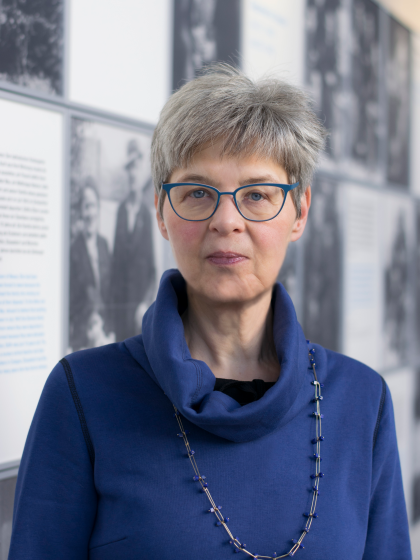R.M. Esser, Prof

Niederländer in Ostfriesland – Sprache, Wirtschaft und Kultur seit der Frühen Neuzeit
Dutch in East Frisia- Language, Economy and Culture since the Early Modern Period
The transnational region of East Frisia, Frisia and Groningen has traditionally been an area of cultural and economic exchange. However, there is still limited research on the nature of this exchange, and more specifically on Dutch influences on East Frisia. The project aims to trace these influences and their changing impact on East Frisian society and vice versa. Together with a team of cross-border project partners, the project will inventorize the evidence of this exchange in regional and local archives and libraries across the border and to develop a research programme to study these influences since the early modern period.
The project has received start-up funding from EDR Interreg (http://www.edr.eu/de), 2020-2021.
Since 2022 2 PhD students funded by the Gerhard ten Doornkaat Koolman Stiftung (https://www. doornkaat-stiftung.de) and the Faculty of Arts, Groningen are researching the different aspects of cross-border relations and influences.
The PhD projects will be realized in collaboration with the University of Oldenburg.
Project leaders: Prof. Dr. Raingard Esser (UG) & Prof. Dr. Bart Ramakers (UG), Prof. Dr. Andrea Strübind (UO).
Project partners: University of Groningen UB Special Collections, University of Oldenburg, Johannes a Lasco Bibliothek Emden, Groninger Archieven, Niedersächsisches Landesarchiv Aurich
Trans (Re-)Formations: Frisian Monasteries as places of transition and reform in the 15th and 16th centuries
The project challenges established views on the anti-monastic narrative of the Reformation which is still prevalent in much of the historiography on the period. Rather than conceptualizing monasteries and their inhabitants as forces of intellectual standstill and backwardness we aim to focus on monasteries as space of education and learning, which contributed to a new approach to spirituality. Humanism and the Devotio Moderna were intellectual and spiritual movements which were also embraced by members of the monastic orders. They offered intellectual pathways into the religious changes in the 16th century and beyond.
The project aims to visualize these monastic contributions through a series of exhibitions on both sides of the Dutch-German border: Kloster Ihlow, Klooster Ter Apel and the Johannes a Lasco Library in Emden has been opened in August 2017.
It is generously funded by EDR (http://www.edr.eu/de) and Freiheitsraum Reformation (http://www.freiheitsraumreformation.de/), 2016-2017.
Project partners: the Universities of Groningen and Oldenburg, Klosterstätte Ihlow, Klooster Ter Apel, Johannes a Lasco Bibliothek Emden, Stichting Oude Groninger Kerken. Stichting Oude Groninger Kerken.
‘...te erhaldinge van alle goede frunttschap en naaburschap’: Crisis, Changing Borders and Citizens’ Resilience in the Eighty Years War’
The project addresses the current academic debates on “crisis” as a form of societal reflection. It challenges the still prevalent notion that premodern societies had a limited repertoire of responses to crises and change, which was predominantly framed in perceptions of a godly and/or eschatological order. While looking at the different media, practices and rituals used to express crisis and to apply a “crisis management”, it investigates the possibilities and resources available to early modern society to cope with crisis and to negotiate change. A range of mechanisms to foster stability in transitional times will be investigated. The study focuses on contemporary historiography, legal codes and material culture(s) applied by various agents as devices for the different rhetorical models used to come to terms with religious conflict and partition: these could be rhetorics of unity or division, continuity or change, memory or oblivion.
The border region of the early modern Low Countries and the Holy Roman Empire provides an ideal laboratory for this study. It utilizes recent research on the embeddedness of early modern notions of change in the local, and it applies theories taken from Border Studies to the scenario in question.
The “Catholic Eye and the Protestant Ear”? The New Materiality of the Sacred
This cross-border project was undertaken in collaboration with colleagues from the University of Oldenburg and the Johannes a Lasco Library in Emden.
The theme “Image and Reformation” is used as a starting point to address contemporary perceptions of the changes that they witnessed in the religious spaces around them. Did they apply a rhetoric of cleansing or reform taken from the confessional debates on pulpit or university? How was the new Counter-Reformation church furniture – confessionals , altar rails etc. – received by Catholics? In many instances, the Reformation changes to church interiors were not complete and elements of the medieval Catholic devotional objects and artefacts remained (for instance in the Ludgeri-Church, Norden, St. Peter, Schleswig). How were these continuations understood.
Key publications: Between the Altar and the Pulpit: The (New?) Materiality of the Spiritual https://er.ceres.rub.de/index.php/ER/article/view/7265
Other funded projects:
"To Proclaim, to Instruct and to Discipline. The Visuality of Texts in Calvinist Churches in the Dutch Republic." NWO funded PhD project, PI Raingard Esser, PhD Student Jacolien Wubs., 2015-2020
